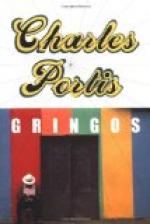The black horse plunged and tried to back away; the white one stiffened against the pull of the rope. Between the two of them, they came near finishing Jose once for all. And from the side where stood the white men came the vicious sound of a pistol shot.
“Slack, Surry!” Jack, on the ground, glimpsed the purpling face of his foe. “Slack, you devil!”
Near sixty feet he had to run—and Jose was strangling before his eyes; strangling, because Surry’s instant obedience was offset by Jose’s horse, who, facing the other at the first jerk of the riata, backed involuntarily with the pull of the pinioned reins. The Spanish bit was cutting his mouth cruelly, and Jose’s frenzied clawing could not ease the cruel strain upon either of them.
A few terrible seconds, and then Jack overtook them, eaught the horse by the bridle, and stopped him; and the blood which the cruel bit had brought when the spade cut deep, stained Jack’s white clothes red where it fell.
“Slack, Surry! Come on!” he cried, his voice harsh with the stress of that moment. And when the rawhide hung loose between the two horses he freed Jose of the deadly noose, and saw where it had burnt raw the skin of his neck on the side where it touched. A snaky, six-strand riata can be a rather terrible weapon, he decided, while he loosed it and flung it from him.
Jose, for the first time getting breath enough to gasp, tried to straighten himself in the saddle; lurched, and would have gone off on his head if Jack had not put up a hand to steady him. So he led him, a shaken, gasping, disarmed antagonist, across the little space that separated them from where Don Andres and four other Spanish gentlemen sat before the middle gate of the corral.
“Bravo!” cried a sweet, girl voice; and a rose, blood-red and heavy with perfume, fell at Jack’s feet. He gave it one cold glance and let it lie. In another moment the black horse crushed it heedlessly beneath his hoof, as Jack turned to the judges.
“Senors, I bring you Don Jose Pacheco.”
So suddenly had the contest ended that those riders who helped to form the riata fence stood still in their places, as if another round had yet to be fought. Beyond the pistol shot and the girl voice crying well done, the audience was quiet, waiting.
Then Jose, sitting spent upon his horse, lifted a hand that shook weakly. His fingers fumbled at his breast, and he held out the shining medal of gold—the medal with diamonds prisoning the sunlight so that the trinket flashed in his hand.
“Senor,” he said huskily, “the medalla—it is yours.”
Jack looked at him; looked at the bent faces of the frowning judges; looked up at Teresita, watching the two with red lips parted and breath coming quickly; looked again queerly at Jose, gasping still, and holding out to him the medalla oro. Jack did a good deal of thinking in a very short space of time.




